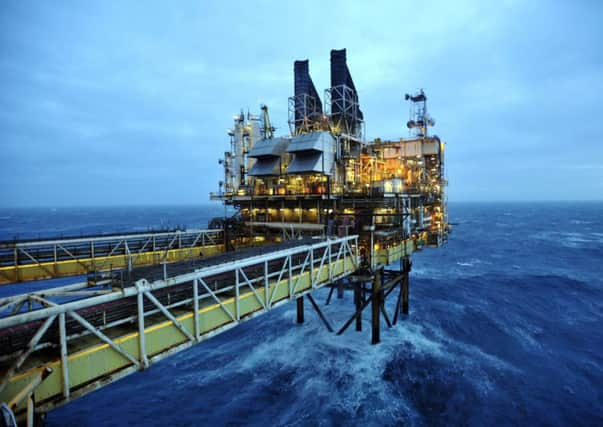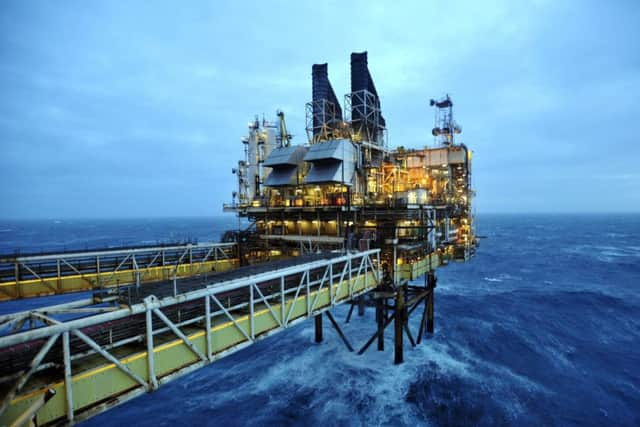Scotland’s cash from North Sea drops by £4.4bn


The figures published yesterday show that Scotland’s deficit – the shortfall between public spending and taxes raised to pay for them – rose by £3.5 billion to reach £12.1bn in 2012-13, leaving Scotland in worse shape than the UK overall for the first time in five years.
A major downturn in North Sea receipts, which dropped to £5.6bn in 2012-13 from £10bn the year before, was behind the rising deficit, as well as a spending push on building projects to boost Scotland’s economic recovery.
Advertisement
Hide AdAdvertisement
Hide AdA gas leak and evacuation at the vast Elgin oil field in the North Sea a year ago, which led to an 11-month unplanned shutdown, was by far the biggest cause of the slump in oil and gas production.


The closure of the oil field, which accounted for around 5 per cent of the UK’s total oil and gas production before the accident last March, knocked an estimated 0.2 percentage points off the UK economy in 2012. It resumed production earlier this week but is not expected to reach full capacity until 2015.
Another less significant factor in reduced production was an industry-wide shift from revenue-gathering to investment in the North Sea.
Yesterday’s figures were contained in the latest Government Expenditure and Revenue Scotland (Gers) statistics which set out Scottish Government spending, as well as the share of Whitehall budgets north of the Border.
Last night, opponents of independence said the figures undermined the case for Scotland to go it alone. Scotland’s relative economic strength over the rest of the UK has been a key plank in the independence campaign.
But Alex Salmond insisted that the North Sea outlook is set to improve in the coming years and he argued that Scotland still raises £800 more in taxes per head of population than the rest of the UK.
Scotland’s 8.3 per cent deficit of GDP is 1 per cent higher than the UK figure of 7.3 per cent.
The First Minister said that investment of about £14bn in the North Sea in recent years will see production, and receipts, increase in the coming years, reducing the deficit.
Advertisement
Hide AdAdvertisement
Hide AdMr Salmond insisted that the 41.5 per cent fall in North Sea revenues was down to “unplanned disruption” to production following a “one-off event” at the Elgin platform, but added that “record capital investment” had seen the amount invested in the oil and gas industry double since 2010.
Mr Salmond said: “This will reduce tax receipts in the short-term but maximise tax revenues in the future.
“Despite these factors, Scotland’s net fiscal deficit was only one percentage point higher than the UK figure in 2012-13.
“For the future, [industry body] Oil and Gas UK forecasts production will increase by 14 per cent between 2013 and 2018.
“And the recent Wood Report made clear the huge benefits that will accrue for many decades to come.”
But opponents claim the figures show the volatility of oil and gas production and prices, and suggest that Scotland could face tax hikes or spending cuts if it was independent.
Former chancellor Alistair Darling, who is heading the pro-Union Better Together campaign, claimed that the figures “make the case against independence”.
“If Scotland was independent today, we would have no option but to cut spending on services like schools and hospitals or put up taxes – or probably both,” Mr Darling said.
“Today, as part of the UK, we don’t have to do that.
Advertisement
Hide AdAdvertisement
Hide Ad“Oil revenues are a major source of Scotland’s income, but are a relatively small part of the UK economy. The drop in oil revenue is so big that it is the equivalent of the entire budget for Scottish schools.”
A shift in Scottish Government spending of £3.1bn on capital investment, such as building schools and roads, and investments in national water board Scottish Water, also helped to push up the country’s deficit,
according to the figures.
Scottish finance secretary John Swinney said the SNP’s decision to “invest heavily” in schemes such as the new Forth Road Bridge, an emergency health centre in Grampian and new prisons at Low Moss and Shotts had “protected jobs and will also deliver long-term benefits”.
He added: “With independence, we will be able to invest even more heavily in Scotland’s future, saving money by not spending on things like Trident and spending it instead on policies like a transformation in childcare.”
If capital spending is excluded, Scotland’s deficit is broadly similar to the UK.
Mr Salmond said the fact that Scotland maintained an “almost identical” deficit to the UK despite a sharp drop in oil revenues shows the “underlying strength of the Scottish economy”.
He said it was important for the electorate to focus on Scotland’s economy over the past five years as they prepare to vote in the independence referendum on 18 September.
The average five-year deficit was -4.3 per cent in Scotland compared with -5.9 per cent across the UK, according to Gers.
Advertisement
Hide AdAdvertisement
Hide AdAbout £65.2bn was spent on all public services in Scotland last year, by both the Scottish and UK governments.
Just £53.1bn was raised in taxes to pay for this, with the shortfall made up from borrowing.
Scotland’s £12.1bn deficit, compares with £114.8bn across the UK as a whole.
Last night, Chief Secretary to the Treasury Danny Alexander said the Gers report “undermines” the economic case for independence.
He said: “It shows that, in 2012-13, the Scottish deficit per person was almost £500 worse than that of the UK. By 2016-17, this gap is forecast to have widened to around £1,000 per person.”
But pro-independence industry body Business for Scotland said Scotland still generates 9.3 per cent of UK taxes, with just 8.3 per cent of the population.
“Scotland’s economic position, relative to the UK finances, would have been £8.3bn better off in the past five years alone,” a spokeswoman said.
“Scotland is clearly a wealthy nation with the resources to be a successful independent country.”
Advertisement
Hide AdAdvertisement
Hide AdLabour said the figures were “an embarrassment” for Alex Salmond and John Swinney.
Finance spokesman Iain Gray said they “completely discredit the SNP’s fiscal case for independence”. He added: “For the last year, the SNP have told us that Scotland is worse off being part of the UK and they have been proven wrong.”
ANALYSIS
John McLaren: ‘The Gers picture of Scotland’s finances is not definitive’
The picture painted in the latest Government Expenditure and Revenues Scotland (Gers) report was much as expected.
Scotland’s fiscal balance worsened, moving from a deficit of £4.6 billion in the financial year 2011-12 to one of £8.6bn in 2012-13. This was due to a big fall in North Sea tax revenues, by over 40 per cent. As around 90 per cent of UK North Sea revenues are allotted to Scotland, based on a geographic share, this means Scotland’s fiscal balance relative to the UK has also worsened.
In 2011-12 Scotland had a relatively better fiscal balance than the UK, as a percentage of GDP and in terms of per head of population. In 2012-13 the UK is in a slightly better position. The First Minister claimed that over the last five years, relative to the UK, Scotland has done a lot better. But his use of Scottish GDP to derive this figure distorts the real underlying position.
This is because much of North Sea-related GDP is non-Scottish owned and so inflates the apparent size of Scotland’s prosperity. A better comparator would be to look at the deficit per head of population. By this measure the countries have averaged similar fiscal balances over the past five years.
Plus, Gers picture of Scotland’s finances is not definitive. On North Sea tax revenues in particular the waters are muddied by a lack of certainty. For example, Her Majesty’s Revenues and Custom have estimated a different tax share from the North Sea for Scotland.
Advertisement
Hide AdAdvertisement
Hide AdWhile Gers gives us a useful insight into past fiscal balances, it not so useful in projecting these forward. This is principally due to the fact North Sea revenues are highly erratic, caused by price and production fluctuations. This is highlighted in the last three years when Scotland’s geographic share of North Sea tax revenues have fallen from £7.5bn in 2010-11, up to £10bn in 2011-12, then down to £5.6bn in 2012-13.
While we know UK North Sea tax revenues are likely to fall again in 2013-14, to around £5bn, beyond that things are less clear. Still, it would take a significant bounce back in production or prices to reach a position similar to that achieved as recently as 2011-12.
• Economist John McLaren is a member of the Centre for Public Policy for Regions
SEE ALSO: